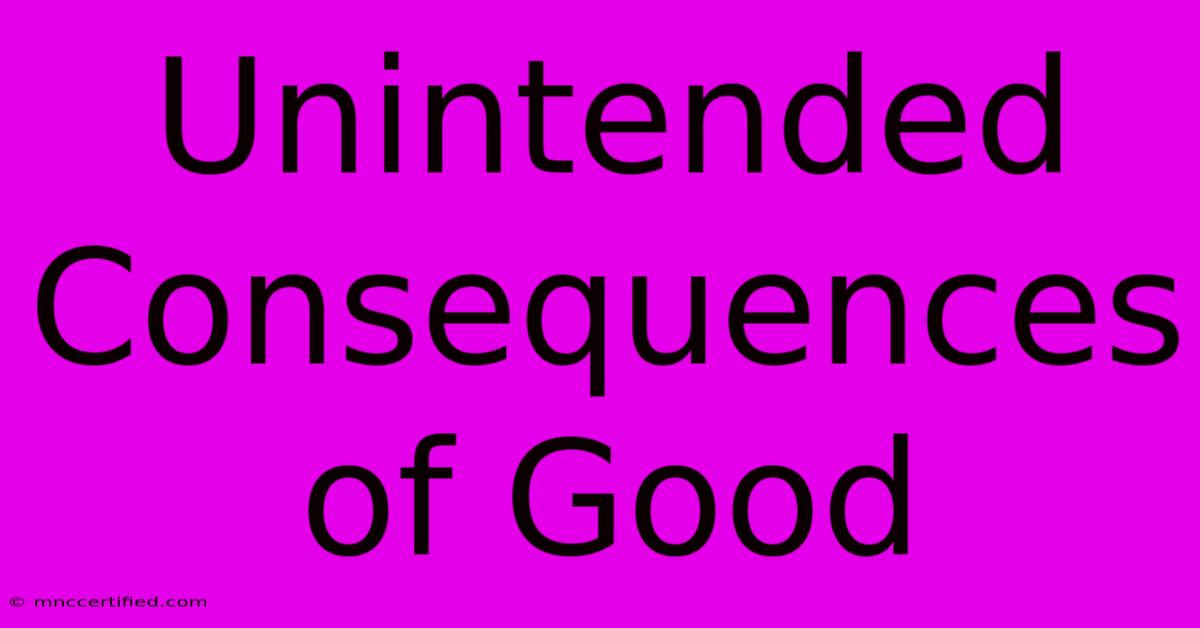Unintended Consequences Of Good

Table of Contents
The Unintended Consequences of Good Intentions: A Paradoxical Exploration
We all strive to do good. Whether it's volunteering at a local soup kitchen, advocating for a cause we believe in, or simply performing acts of kindness, the desire to improve the world is a fundamental human trait. However, the path to positive change is often paved with unforeseen and sometimes paradoxical consequences. This article explores the fascinating and often frustrating reality of unintended consequences, specifically examining how well-meaning actions can sometimes lead to negative outcomes.
The Law of Unintended Consequences: A Deeper Dive
The "law of unintended consequences" isn't a strict law of physics, but rather an observation about the complex interplay of actions and reactions within systems. Simple actions can have ripple effects, creating outcomes completely different from those originally intended. This is especially true in complex social and ecological systems where multiple variables interact in unpredictable ways.
Examples of Unintended Consequences:
-
Technological Advancements: The Industrial Revolution, while drastically improving living standards for many, also led to pollution, resource depletion, and social inequalities. Similarly, the invention of the internet, while connecting billions, also created challenges like cyberbullying, misinformation, and privacy violations.
-
Social Policies: Well-intentioned social programs can sometimes have unforeseen negative impacts. For example, subsidies intended to support farmers might lead to overproduction and depressed market prices, hurting farmers in the long run. Similarly, minimum wage increases, while aiming to improve worker income, could lead to job losses if businesses can't afford to pay higher wages.
-
Environmental Conservation: Efforts to protect endangered species can sometimes have unintended consequences. For instance, protecting a predator species might inadvertently lead to a decline in its prey population. Similarly, reforestation projects, while vital for carbon sequestration, can alter local ecosystems and impact biodiversity.
-
Philanthropic Efforts: Even charitable acts can have unintended negative outcomes. Providing aid without addressing underlying issues can create dependency and hinder long-term sustainable solutions. For instance, simply providing food without investing in local agriculture can undermine local economies and food security in the long run.
Understanding the Root Causes
Why do good intentions so often lead to unintended consequences? Several factors contribute to this paradoxical phenomenon:
-
Incomplete Information: We rarely possess perfect knowledge of all the variables at play when we take action. Our understanding of complex systems is often limited, making it difficult to predict the full range of potential outcomes.
-
Unforeseen Interactions: Actions often have cascading effects, triggering unexpected interactions between different parts of a system. These interactions can amplify or negate the intended effects of the initial action.
-
Short-Term vs. Long-Term Thinking: We tend to focus on immediate results, often overlooking the long-term implications of our actions. This short-sightedness can lead to unintended consequences that emerge over time.
-
Lack of Feedback Loops: Without proper monitoring and evaluation, it's difficult to assess the true impact of our actions. Effective feedback loops are essential for identifying and mitigating unintended consequences.
Mitigating the Risk of Unintended Consequences
While we can't eliminate unintended consequences entirely, we can take steps to mitigate the risks:
-
Thorough Research and Analysis: Before taking action, invest time in research and analysis to understand the potential impacts of your choices. Consider all stakeholders and potential consequences.
-
Adaptive Management: Embrace flexibility and adaptability. Be prepared to adjust your approach based on feedback and new information. Continuously monitor and evaluate the effects of your actions.
-
Collaboration and Stakeholder Engagement: Involve stakeholders in the decision-making process. Consider diverse perspectives and incorporate feedback to improve your understanding of potential outcomes.
-
Focus on Systemic Solutions: Rather than focusing on quick fixes, strive to address the underlying causes of problems. Systemic solutions are more likely to yield sustainable and positive results.
Conclusion: The Importance of Foresight and Humility
The unintended consequences of good intentions highlight the complexity of the world and the limitations of human foresight. Recognizing this paradox is crucial for navigating the challenges of creating positive change. By embracing humility, fostering collaboration, and prioritizing careful analysis, we can increase our chances of achieving our desired outcomes and minimize the risk of unintended harm. Ultimately, the pursuit of good requires not just good intentions, but also foresight, adaptability, and a deep understanding of the systems we seek to improve.

Thank you for visiting our website wich cover about Unintended Consequences Of Good. We hope the information provided has been useful to you. Feel free to contact us if you have any questions or need further assistance. See you next time and dont miss to bookmark.
Featured Posts
-
Foster Care Claim Challenged By Advocate
Dec 13, 2024
-
6 Player Prop Bets Rams Vs 49ers Week 15
Dec 13, 2024
-
Trumps Kari Lake Pick Voa Fears
Dec 13, 2024
-
Trumps Lake Pick Stirs Voa Concerns
Dec 13, 2024
-
Purdys Admission Taylor Swift Trending
Dec 13, 2024